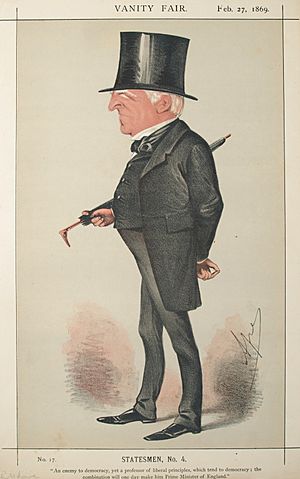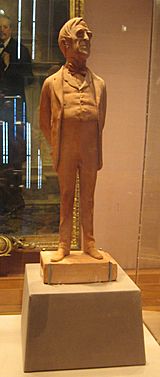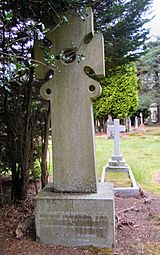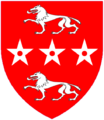Robert Lowe facts for kids
Quick facts for kids
The Viscount Sherbrooke
|
|
|---|---|
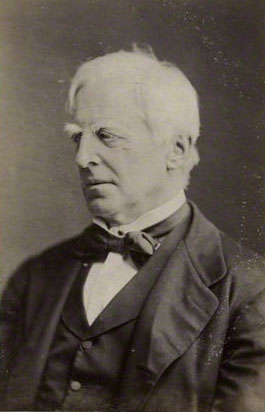 |
|
| Chancellor of the Exchequer | |
| In office 9 December 1868 – 11 August 1873 |
|
| Monarch | Victoria |
| Prime Minister | William Ewart Gladstone |
| Preceded by | George Ward Hunt |
| Succeeded by | William Ewart Gladstone |
| Home Secretary | |
| In office 9 August 1873 – 20 February 1874 |
|
| Monarch | Victoria |
| Prime Minister | William Ewart Gladstone |
| Preceded by | Henry Bruce |
| Succeeded by | R. A. Cross |
| Personal details | |
| Born | 4 December 1811 Bingham, Nottinghamshire |
| Died | 27 July 1892 (aged 80) |
| Political party | Liberal |
| Spouse | Georgiana Orred (d. 1884)
Caroline Anne Sneyd (d. 1914) |
| Alma mater | University College, Oxford |
Robert Lowe, 1st Viscount Sherbrooke (1811–1892) was an important British politician. He helped shape British politics in the late 1800s. He worked for Prime Minister William Ewart Gladstone. Lowe was the Chancellor of the Exchequer (in charge of the country's money) from 1868 to 1873. He was also the Home Secretary (in charge of internal affairs) from 1873 to 1874.
People remember Lowe for his work in education. He also strongly opposed changes to how people voted. He helped create modern UK company law. When Gladstone made Lowe Chancellor, he hoped Lowe would save money. However, public spending actually went up. Lowe often guessed that the government would earn less money than it did. This allowed him to avoid cutting taxes and instead reduce the country's debt. He believed taxes should be fair for everyone.
Contents
Robert Lowe's Early Life
Robert Lowe was born in Bingham, Nottinghamshire, England. He was the second son of a church leader, Reverend Robert Lowe. His mother was Ellen Pyndar. Robert Lowe had albinism, which meant his eyesight was very poor. At first, people thought he might not be able to go to school.
In 1822, he started school in Southwell. Later, he went to Risley and then to Winchester in 1825. Lowe wrote that school life back then was tough, with not enough food. He found learning Latin and Ancient Greek easy.
Lowe then went to University College, Oxford. He enjoyed his time there. He studied with Benjamin Jowett and earned high grades. He also took a leading role in debates at the Oxford Union.
In 1835, he became a fellow at Magdalen College, Oxford. He left this position when he married Georgiana Orred in 1836. For a few years, Lowe was a successful teacher at Oxford. In 1838, he was disappointed when he was not chosen to be a professor of Greek at the University of Glasgow.
Time in Australia
In 1841, Lowe moved to London to become a lawyer. But his eyesight got worse. Following medical advice, he sailed to Sydney in the colony of New South Wales, Australia. There, he started working in the law courts. In 1843, the Governor, Sir George Gipps, chose Lowe to join the New South Wales Legislative Council.
Lowe disagreed with Governor Gipps and left the council in 1844. But he was elected again in 1845 for the Counties of St Vincent and Auckland. He held this seat until 1848. Then, he was elected for City of Sydney until 1849.
Lowe quickly became known in Australian politics for his smart speeches. He spoke a lot about money and education. He also had a large legal practice. He helped start and write for a newspaper called the Atlas.
In 1844, Lowe defended a Royal Navy captain, John Knatchbull, in a murder trial. Lowe was one of the first to argue that the captain had a mental illness, but it did not succeed. Knatchbull was executed. Lowe and his wife adopted the two orphaned children of the victim.
On January 27, 1850, the Lowes and the two children sailed back to England.
British Politics
Early Career in Parliament
Lowe's good reputation from Oxford and his experience in Australia helped him in England. The Times newspaper hired him as a writer. He became very influential through his articles. In 1852, he was elected to the Parliament for Kidderminster. He joined the Liberal group.
In the House of Commons, his sharp arguments made a big impact. He gained experience in government under Liberal leaders from 1853 to 1858. He worked as Secretary to the Board of Control and Vice-President of the Board of Trade. During this time, the Joint Stock Companies Act 1856 was passed. This was the first law to organize company rules across a whole country. Some call him "the father of modern company law."
In 1859, Lowe moved to the Education Office. He became Vice-President of the Committee of the Council on Education. He pushed for a strong policy called "payment by results." This meant schools would get public money based on how well students did in exams, especially in reading, writing, and arithmetic. He believed that after the 1867 voting reforms, "we must educate our masters" (meaning the newly enfranchised working class). He also surprised his old university friends by focusing on science over classical studies. Many people opposed his new education rules. In 1864, Lowe had to resign because Parliament voted against how inspectors' reports were handled.
Debates on Voting Reform
Lord Palmerston had been against giving more people the right to vote. When he died in 1865, it opened the door for a new government led by Russell and Gladstone. They introduced the Reform Bill of 1866, which aimed to expand voting rights. Lowe continued Palmerston's views. He was worried about the growing power of workers' unions he had seen in Australia.
Lowe had already spoken against giving more people the right to vote in 1865. He was not asked to join the new government. Lowe joined other Liberals and Whig peers who opposed the bill. They were called the 'Adullamites'. He gave powerful speeches that made his reputation as a speaker very high. His speeches helped cause the government to fall.
However, Benjamin Disraeli, who led the next Conservative government, proposed his own Reform Bill. This bill passed and became the Reform Act 1867. Lowe believed that any step towards more democracy was bad. He thought it would lead to "endless agitation." He felt that voting should be based on wealth and intelligence, not just numbers of people.
Supporters of the Bill argued that allowing people with less property to vote would include respectable working-class citizens.
Robert Lowe saw unions as a threat. He believed that society should be organized around people investing money, not just their labor. Since only property owners could be in Parliament, Lowe worried that changing voting rules would lead to unknown problems.
Gladstone's Government
Even though Lowe's speeches did not stop the Second Reform Act from passing, he won the next election. He became the first MP for London University, a new area created by the very Act he opposed. In 1868, he joined the Gladstone Cabinet as Chancellor of the Exchequer. He described this job in 1870 as: "The Chancellor of the Exchequer is a man whose duties make him more or less of a taxing machine. He is entrusted with a certain amount of misery which it is his duty to distribute as fairly as he can."
Lowe was a very practical economist. He was proud that he cut taxes by twelve million pounds during his four years in office. But some of his decisions, like removing a small tax on corn in 1869, are not seen as good ideas today. His plan in 1871 to tax matches (he called it ex luce lucellum, meaning "out of light a little profit") caused a huge protest and had to be dropped. In 1873, he moved to the Home Office. But in 1874, the government resigned.
Later Years
Lowe spoke against the Royal Titles Bill 1876 in 1876. He suggested that Queen Victoria herself was behind the bill. Because of this, when the Liberals came back to power in 1880, Queen Victoria said she would not accept any government that included Lowe.
However, he was still given a special title, becoming Viscount Sherbrooke. This title ended when he died. He received this title against Queen Victoria's wishes, but with the support of William Gladstone. In 1885, he was also honored as a Knight Grand Cross of the Order of the Bath.
From 1875 until his death in Warlingham, Surrey, his health slowly got worse. He appeared less and less in public life. He supported the Liberal Unionist party in 1886.
Robert Lowe died on July 27, 1892. He was buried in Brookwood Cemetery.
Australian Electoral Division
The Division of Lowe, an Australian voting area in Sydney, was named after him. This division no longer exists.
Images for kids
See also
- Liberal Party (UK)
- Reform Act 1867
- UK company law


